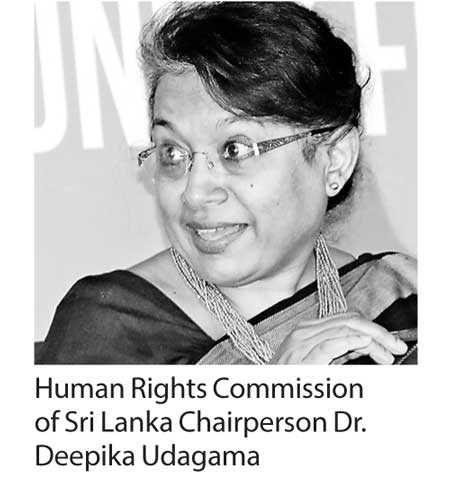Wednesday Feb 18, 2026
Wednesday Feb 18, 2026
Saturday, 1 September 2018 00:00 - - {{hitsCtrl.values.hits}}
 Human Rights Commission of Sri Lanka Chairperson Dr. Deepika Udagama believes attitudes of the people must change for the country to move forward and adequately address the sufferings of families of disappeared persons.
Human Rights Commission of Sri Lanka Chairperson Dr. Deepika Udagama believes attitudes of the people must change for the country to move forward and adequately address the sufferings of families of disappeared persons.
“We should not look at this through a political or racist perspective,” she said, and pointed out that some harbour negative feelings toward the Office of Missing Persons (OMP). She commended the OMP for being the first State affiliated organisation to mark the International Day of the Disappeared and acknowledged more support needed to be given to institutions like the OMP to promote reconciliation and harmony.
“Still, those trying to find their missing loved ones are called traitors, while those responsible for the disappearances may be regarded heroes,” she said delivering the keynote address at an OMP event to mark the International Day of the Disappeared.
Dr. Udagama said there must be a reckoning with this difficult past in order for the country to progress as a nation. “If we are to have a civilised country, we have to see that these things do not happen again,” she said.
She was delivering the keynote address at the J. R. Jayewardene Centre in Colombo to mark the International Day of the Victims of Enforced Disappearances. A large gathering of family members of the missing persons, government officials, civil society members and representatives of foreign missions were present.
“If anyone can listen to these stories and watch these images of the struggle of families of the disappeared without being moved, there is something terribly wrong with this country.”
Dr. Udagama stressed that, much like the incessant pain of the friends and family of the disappeared, human rights violations against these individuals are unending. “Under international law, enforced disappearances are continuing violations. From the moment a person is deprived of their liberty, the violation continues,” Udagama said.
According to the United Nations Human Rights commission, enforced disappearance is defined by three elements: “deprivation of liberty against the will of the person, involvement of government officials, at least by acquiescence, and refusal to acknowledge the deprivation of liberty or concealment of the fate or whereabouts of the disappeared person.” In Sri Lanka, many of these disappearances are in connection with the Civil War and the 1980s JVP insurrection. Years later, families still wait for answers in a purgatory between mourning and hoping.
Dr. Udagama attributes the slow progress, in part, to a lack of consistency in the political system and unstable institutions. “In Sri Lanka, democracy has not been properly established,” she said. “The government changes and people change and things happen in a different manner. We have to strengthen our institutions.”